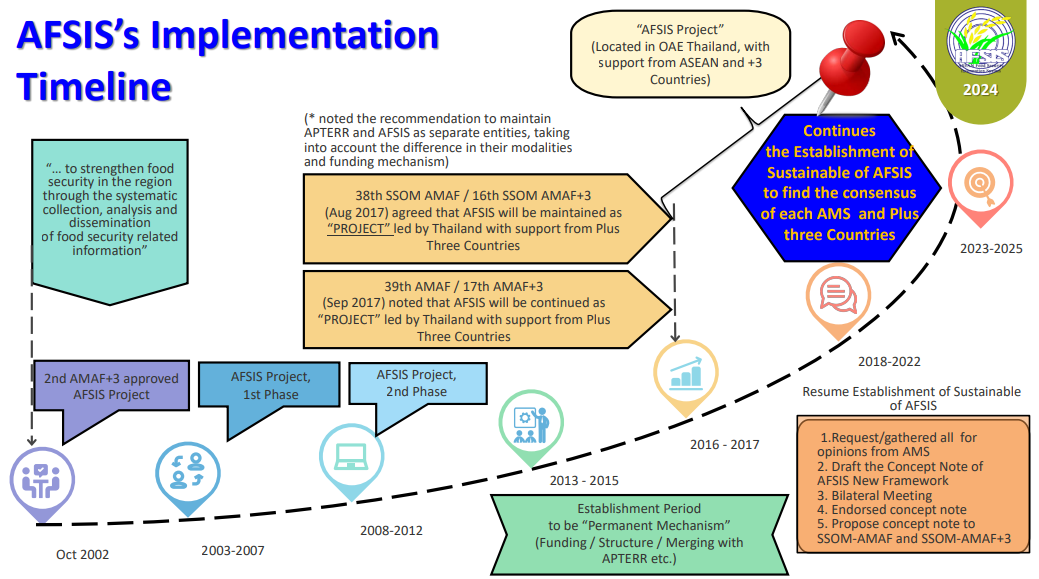
Due to the growing concern on food security in regional communities, the Ministers of Agriculture and Forestry of the ASEAN Member States plus People's Republic of China, Japan and Republic of Korea approved the AFSIS project during the meeting held in October 2002 in Lao PDR. Then, AFSIS was initially established as a project with financial support from the Ministry of Agriculture, Forestry and Fisheries (MAFF) of Japan and a substantial contribution from the Office of Agricultural Economics, Ministry of Agriculture and Cooperatives, Thailand. The overall objective of the project is to strengthen food security in the region through the systematic collection, analysis and dissemination of food security related information.
The 1st phase of AFSIS covered period of 5 years, from 2003 to 2007 and with the success and potential of the 1st phase, the implementation plan of the 2nd phase project was endorsed by the AMAF+3 Meeting in November 2007 in Bangkok, Thailand. The implementation plan of the 2nd Phase covered period of 5 years from 2008-2012 with financial support from MAFF of Japan.
With response to the increasing of undernourished people in the region and the impact of soaring food prices, the 12th AMAF+3 Meeting in Vientiane, Lao PDR on 28 September 2012 unanimously agreed to endorse transformation of AFSIS from "Project" to "Permanent Mechanism" under AMAF+3 as the three-year establishment work plan during 2013-2015.
After the assessment of establishing AFSIS as a permanent mechanism, some related issues could not finalized; therefore, at the 38th SSOM AMAF Meeting and the 16th SSOM AMAF+3 Meeting, held on 14-16 August 2017 in Singapore, finally agreed that AFSIS to be maintained as "Project led by Thailand with support from Plus Three Countries". The 17th AMAF+3 Meeting, held on 25-29 September 2017 in Chiang Mai, Thailand, noted that AFSIS will be continued as "Project led by Thailand with support from Plus Three Countries" since then.

Project Components
To achieve the objective in strengthening regional food security, the implementation of AFSIS contains 2 main components, which are:
1. Human Resource Development
AFSIS aims to raise the capacity of Member States through a combination of activities i.e. trainings, workshops and national seminars. These activities were planned to provide related personnel in Member States with knowledge and skills in Statistics and the development of food security information system to ensure that they will be capable to implement AFSIS's activities competently and at the same standard.
2. Information Network Development
Under this component, the development of regional food security information network including the database were included in the plan so that concerned organizations in Member States can disseminate and acquire food security related data required for policy planning and implementation.
To fulfill those 2 components, AFSIS with support from Plus Three Countries has implemented such as workshop, training and reports as follows:
a) Workshops and Trainings such as Workshop on China-ASEAN Information Management and IT Application of Food Safety Production, SAKURA, Capacity Building Workshops on ASEAN+3 Rice Trade Forecast Model for ASEAN+3 officials
b) Reports such as ACO, EWI, RGO
c) Supporting Projects from MAFF of Japan such as ALIS, F-Model, ISFAS, SAS-PSA and SAFER
d) Supporting Projects from Republic of Korea such as Real-Time AFSIS project, IT-based ASEAN+3 Food Security Cooperation and Support for Capacity Building
Expected Outputs
The outputs from the implementation of AFSIS can be expected as follows:
1. Member States will be capable of providing accurate, reliable and timely information required for the construction of regional food security information at the same standard.
2. AFSIS will be able to provide complete information needed for planning and implementation of food security policy in the region.
3. The development of early warning information and commodity outlook will facilitate the management of food security policies and programs. These activities will help to assess food security situations in the region and identify the areas where food insecurity is likely to occur as well as the degree of seriousness.
4. The responsible agencies to be better aware of the problem in food security, so that affected people will receive better responses and support to release their difficulties.
Project Administration
The Focal Point Meeting (FPM) which consists of representatives from Focal Point Agencies in every Member States in body responsible for managing and assisting in carrying out the activities of AFSIS. The annual FPM is the decision-making mechanism of the AFSIS to discuss, review and decide on the following matters:
1. Work plans of AFSIS
2. Implementation of AFSIS activities at the regional and national levels
3. Other important matters relevant to the implementation of AFSIS
In the 18th FPM, the meeting welcomed and initiative to conduct the FPM by annual rotation in an alphabetical order started from Brunei Darussalam in 2020.